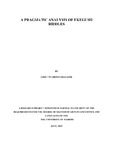| dc.description.abstract | This research is based on a Pragmatic Analysis of Ekegusii riddles and opines that riddles lay an
important role in educating not only children but also adults. Focusing on riddles from the
Abagusii community and while contending that riddles fall into different categories among them
literal and metaphorical riddles. Primary data for analysis was obtained from a book
Chimbachero Chi’Abagusii from which fifty riddles were identified and analysed. Anchored in
Relevance Theory as its theoretical framework, the paper explored classes into which Ekegusii
riddles fall, it also examined the participants in the riddling process and the role of context and
cultural information in interpreting Ekegusii riddles. Forty riddles were analysed under
Relevance Theory while ten were used as examples. The findings were: first, Ekegusii riddles
were identified selected and classified into literal riddles which are understood from the words
constituted in them and their simplicity in linguistic and logic form, and metaphorical riddles
which are interpreted and understood based on context and cultural knowledge. It also observed
that both children and adults take part in the riddling process. Finally, it also found out that
context and cultural knowledge play a major in interpreting and understanding Ekegusii riddles | en_US |

